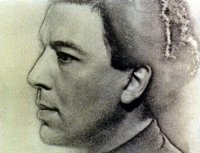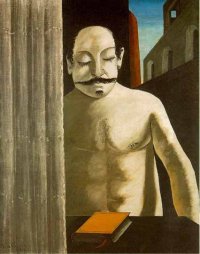
 André Breton
André Breton

 André Breton
André Breton
by Robert S. Robbins
André Breton is perhaps the most significant figure in the
avant-garde. As the founder of Surrealism, he developed the essential
concepts for any exploration of the unconscious in art and literature.
Unfortunately, art historians have relegated Surrealism to a brief chapter
in their textbooks. But Surrealism was more than an art movement. It sought
to integrate the dream life with consciousness and introduced psychology
into art's intellectual framework. The surrealists explorations remain vital
and essential and their artistic intentions must be pursued in order to
address many pressing concerns. It is unreasonable to discredit surrealism,
as if psychology does not offer insights into the artist's work or the
unconscious has no relevance to the real world.

Breton followed in the French tradition of metaphysical poets who sought to transcend reality and discover the marvelous by going beyond consciousness. This curious poetic quest began with Baudelaire who believed poetry could discover correspondences to a higher reality. It continued with Mallarmé's attempts to elevate a symbol to the essential and found its greatest expression in Rimbaud who sought to make himself a voyant. Breton was profoundly influenced by Rimbaud and Lautréamont, two poets accepted as precursors to surrealism. The French poets' spiritual quest can be understood as an attempt to elevate poetry's significance and discover the secrets of inspiration.
Surrealism brought to this tradition the exciting new discovery of the unconscious. It is only natural that Breton's generation would have to reconcile psychology's research with their literary predecessor's ventures into this realm. The surrealists developed several techniques to explore the unconscious for poetic imagery. Automatic writing was an attempt to free writing from conscious control so that the unconscious would reveal itself in the stream of words. The exquisite corpse was a parlor game in which everyone would take turns completing a sentence to create an arbitrary juxtaposition of words. More interesting was the surrealist object, "any alienated object, one out of its habitual context...confer upon it artistic value by isolating it from its habitual context, oblige others to consider it in itself and to forget its purpose, and you have created a strange object, catalyst of a host of unconscious desires." pg. 382 Revolution of the Mind
Although Breton
was an accomplished poet and seemed to appreciate the importance of tapping
into the unconscious, there is no evidence that his interests were based
upon any natural ability to reach into his unconscious. Breton was more
intellectual than passionate and he was very involved in the external world,
particularly politics. He displayed none of the self-absorption typical of
someone paying more attention to inner experiences than external events.
Incapable of exploring the unconscious directly, Breton relied on fragments
of dreams, strange coincidences, and psychological experimentation. His
belief in the magical properties of chance and coincidence show him to be
too focused on the material world. However, Breton is remarkable for his
sustained interest in the artist's inner vision and his attitudes reflect
the proper values. For instance, Breton had a lifelong disdain for the
writer's "career" and on page 504 his biographer observes,
"For
Breton the ability to wield a brush was second to the power of the artist's
inner resources." In other
words, Breton realized that craftsmanship was not what was vital and
essential. He also seemed to realize that only the unconscious offers the
marvelous. There does seem to be many instances when Breton experienced an
emotional reaction to a woman or a place that was quite inexplicable and all
out of proportion to the rational significance. This is evidence of the
unconscious at work and its influence upon him.
Breton did have an unfortunate and disagreeable habit of excommunicating members of the surrealist group. Although these expulsions may have been justified by the need to maintain surrealism's intellectual integrity, they often appear to have been an especially cruel way of rejecting his peers. And it is quite possible the excommunications reinforced the idea that surrealism was merely an art movement or school of thought rather than a fundamental mode of thought. Breton became known as the Pope of Surrealism for his excommunications. Given his hatred of Catholicism, this insult was very grave indeed.
Surrealism provides many valuable insights and concepts to anyone seeking to understand the unconscious and its role in art and poetry. Breton placed great faith in the potential of the unconscious for poetry. He believed it would give us the marvelous which is always sublime. Surrealist art revealed how strange juxtapositions and the placement of objects out of their normal context could vanquish our familiarity with the world and permit us to see once again with the eyes of a child. The exquisite corpse game and automatic writing brought the same curious juxtapositions to words but with less effect. Surrealists are important artists both for their testament to the significance of the unconscious and their sustained efforts to explore this seldom acknowledged aspect of our lives.

